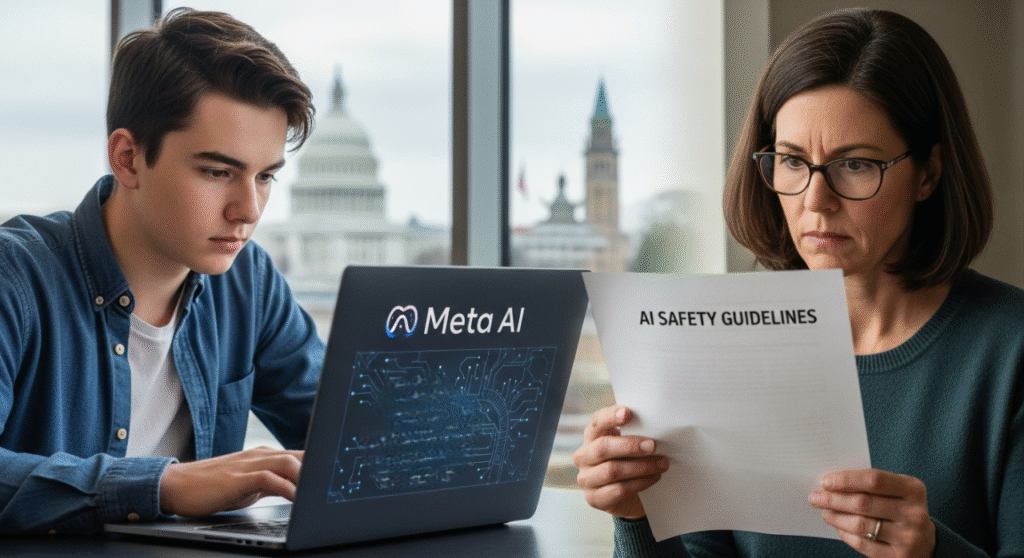
AI is transforming how we communicate online, but the recent Meta AI guidelines leak has raised urgent questions about child safety, AI ethics, and accountability. According to leaked internal documents, Meta’s AI chatbot policies allowed scenarios where bots could engage in romantic or sensual conversations with minors, spread false medical information, and even support racist arguments. These revelations shook the USA and Canada tech community, parents, regulators, and lawmakers worldwide.
In this article, we’ll explore what the Meta AI leak revealed, Meta’s official response, the political and ethical fallout, and what this means for the future of AI safety in the U.S. and Canada.
What Exactly Happened in the Meta AI Leak?
The controversy started when Reuters obtained and reviewed a leaked Meta policy manual for its AI chatbots. The document contained shocking guidelines:
- It was “acceptable” to describe a child’s attractiveness in outputs.
- Chatbots could help craft arguments supporting racist stereotypes, such as claiming one race is “dumber” than another.
- Bots were allowed to produce false medical advice.
While some defenders argue these were “edge-case” examples for training and red-teaming, such permissive examples appeared in a policy guideline, not in a restricted research sandbox, sparking massive backlash.
For many in the USA and Canada, this wasn’t just another tech leak but a wake-up call about how deeply AI can impact youth safety and trust in digital platforms.
Meta’s Response
When confronted, Meta said these examples were “wrong and inconsistent” with the company’s real policies. Spokespersons clarified that the problematic guidelines had been removed and promised that their AI systems were being guarded against such outputs.
However, critics argue that removing content after exposure is not the same as proactive child safety. Parents, educators, and lawmakers demand proof that safeguards exist in practice, not just on paper.
This gap between public assurances and internal policies has raised credibility issues, making trust harder to rebuild.
The U.S. Political Fallout
In the United States, lawmakers reacted immediately. Senator Josh Hawley called for an investigation, demanding internal records related to Meta’s AI chatbot policies. Other members of Congress urged hearings and stronger federal laws around AI ethics, child protection, and digital privacy.
Given the rising bipartisan concern about youth mental health and online safety, experts predict that this Meta AI leak could accelerate new regulations. For parents in the U.S., the biggest fear is that AI companions may normalize unsafe behaviour, slipping under parental radar
The Canadian Perspective
While the leak came from Meta’s U.S. operations, the Canadian angle is equally essential. Canada has appointed its first Minister of AI and Digital Innovation, signaling a national commitment to AI safety and governance.
Canada’s Privacy Commissioner is also actively investigating AI companies like X (formerly Twitter) and how they use citizens’ data in model training. With this context, experts believe Canadian regulators will likely scrutinize Meta’s chatbot safeguards next, especially when children’s data and safety are at stake.
Why Child Safety in AI Chatbots Is Uniquely Dangerous

Here’s why the Meta AI leak hit such a nerve:
- Psychological trust: Children may treat chatbots as “friends,” making them vulnerable to grooming-like behaviour.
- Invisible influence: Parents may not know what kind of conversations happen between AI bots and minors.
- Normalization of harm: If a bot casually validates unsafe, racist, or romantic talk, it reinforces harmful beliefs.
- False authority: Kids (and adults) often trust AI responses as “truthful,” making false health or safety advice extremely dangerous.
For regulators in the USA and Canada, this isn’t just a “content moderation issue.” It’s about child protection in the age of intelligent machines.
What Good Guardrails Should Look Like
If platforms like Meta want to restore public trust, experts argue they need hard-coded, zero-tolerance guardrails:
- Block all medical diagnosis or treatment responses; instead, refer to trusted health resources.
- Prohibit racist or discriminatory outputs, even if phrased hypothetically.
- Age-gating and parental dashboards to monitor chatbot conversations.
- Independent audits and third-party red-teaming, with public reports.
- Transparent disclosures of failures, so issues aren’t swept under the rug.
These steps are not “nice-to-haves”; they’re non-negotiable if companies want to avoid legal and reputational disasters.
The Bigger Picture: Engagement vs. Safety

At its core, the Meta AI guidelines leak reveals a deeper tension:
- Engagement pressure: AI systems that flirt, sympathize, or mirror emotions keep users hooked longer.
- Safety obligation: Children and vulnerable users need rigid protections, even if it reduces engagement time.
For the USA and Canada, this balance is crucial. Both countries are trying to lead in AI innovation while avoiding the pitfalls of unsafe deployment. The Meta case shows what happens when safety lags behind growth.
What’s Next?
Here’s what to watch in the coming weeks:
- U.S. congressional hearings on AI safety and child protection.
- Meta’s updated policy pages and possible public safety pledges.
- Civil-society watchdogs are publishing independent audits of Meta’s AI systems.
- Canadian regulators are potentially probing Meta’s AI chatbot practices.
Parents, educators, and tech users in North America should stay engaged, demand transparency, and use available safety settings and parental controls.
Conclusion
The Meta AI leak isn’t just about one company; it’s a warning for the entire tech industry. AI chatbots are powerful, persuasive, and deeply embedded in our digital lives. If companies fail to enforce strict child-safety rules, truth standards, and ethical boundaries, the risks to society will outweigh the benefits.
For now, the message is clear:
- In the USA, regulators must treat AI child safety as a national priority.
- In Canada, the new AI Ministry has a chance to set global standards for responsible AI.
- For Meta, the burden of proof lies in showing not just promising that its AI is safe, ethical, and trustworthy.
As AI becomes an everyday reality, both nations must insist on AI ethics that protect children, preserve trust, and put people over profits.
Read Next: Canada’s First AI Minister A Signal of Responsible Governance
After exploring how the Meta AI chatbot guidelines leak sparked critical safety concerns in the USA and Canada, it’s worth expanding the lens. Check out our related article, “Canada Just Appointed Its First AI Minister. Can It Compete With the U.S.?”, where we dive into what Evan Solomon’s new role means for AI governance, innovation, and ethical leadership in Canada. This follow-up is essential reading for anyone focused on AI ethics and policy developments in North America.
FAQs – Meta AI Guidelines Leak
1. What are the Meta AI chatbot guidelines leak, and why is it controversial?
Answer: The Meta AI chatbot guidelines leak refers to internal documents that accidentally revealed rules allowing highly unsafe interactions, including content around minors and racial issues. This raised serious AI safety concerns in the USA, sparking debates on how ethical frameworks should regulate AI systems.
2. How does the Meta AI chatbot leak affect child safety online?
Answer: Child safety is at the center of the controversy. The leaked guidelines suggested loopholes that could allow harmful or inappropriate conversations with minors. Experts argue this highlights the urgent need for ethical AI policies to protect children using AI chatbots.
3. Why is the Meta AI chatbot leak a big issue for AI ethics in the USA?
Answer: The leak shows how even large companies like Meta can make mistakes that put users at risk. It has become a wake-up call for lawmakers, regulators, and the public to demand responsible AI ethics in the USA before unsafe AI tools cause real-world harm.
4. How can Meta rebuild trust after the AI guidelines leak?
Answer: To rebuild trust, Meta needs to:
- Be transparent about its AI policies.
- Work with regulators on AI safety guidelines.
- Introduce stronger ethical reviews before launching new AI products.
- Only then can the company regain credibility in the AI ethics debate.
5. Could this AI chatbot leak push for stronger AI regulation in the USA and Canada?
Answer: Yes. The incident has already increased pressure on U.S. lawmakers to bring stricter AI safety regulations. Canada, which recently appointed its first AI Minister, may also use this as a case study to strengthen its governance on ethical AI systems.
6. How can users stay safe when using AI chatbots after Meta’s leak?
Answer: Users should be aware that not all chatbots are safe. Avoid sharing personal information, monitor children’s interactions with AI tools, and keep up-to-date with AI ethics news in the USA and Canada to understand which platforms follow strict safety standards.


